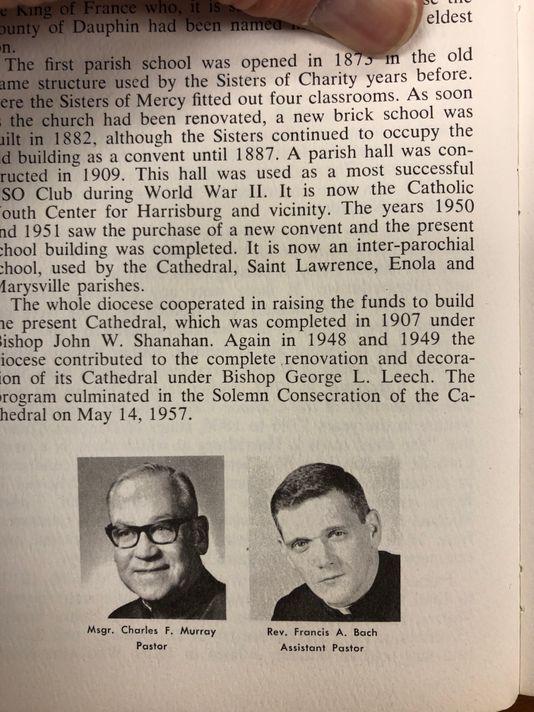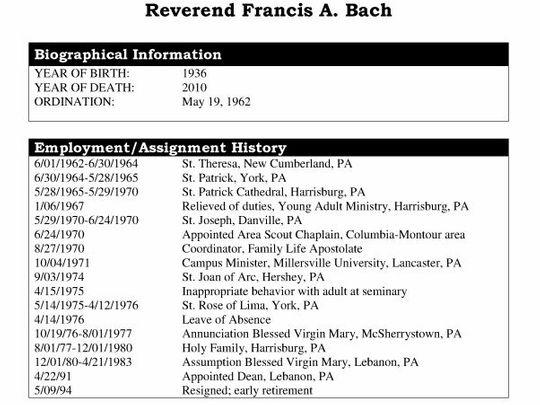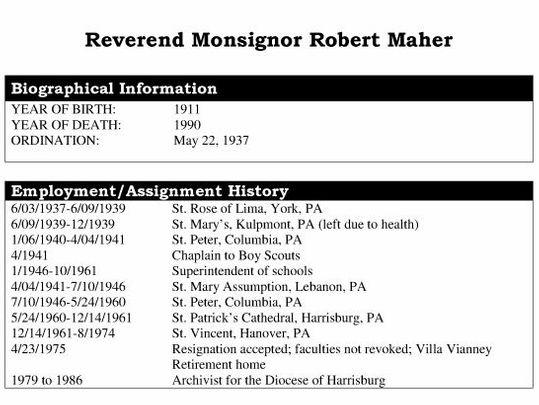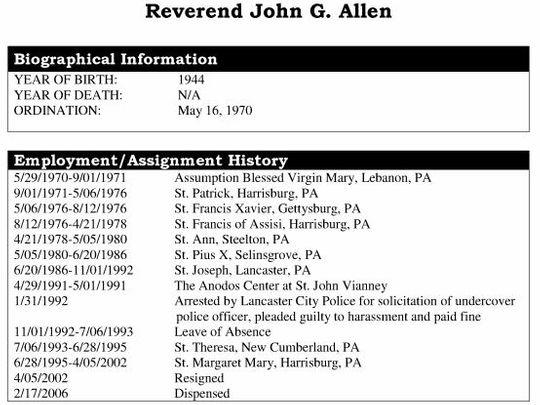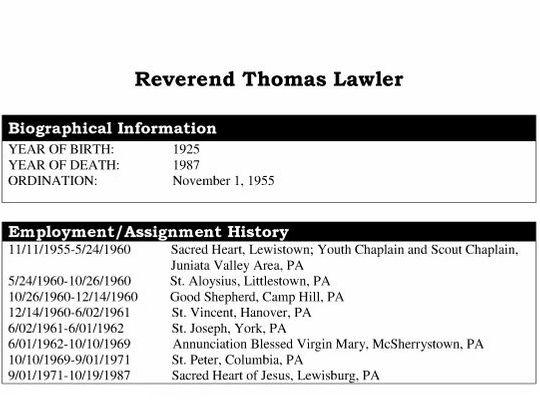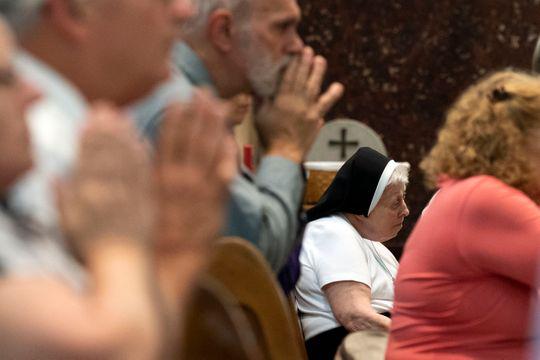|
One priest was arrested for soliciting sex, but his diocese just moved him again
By Candy Woodall
[with video] The Rev. Francis Bach had several warning signs in his past, but that didn't stop a diocese from assigning him to multiple churches in central Pennsylvania. In 1967, he was "relieved of his duties" with a young adult ministry in Harrisburg. That was a few years after he served at St. Patrick Catholic Church in York, a city of about 45,000 residents 80 miles west of Philadelphia where a man in 2016 said Bach abused him as an altar boy in 1960 when Bach was a seminarian. Ten years later, Bach had more blemishes on his employment history. He's one of several examples in central Pennsylvania of the diocese shuffling predator priests, called "passing the trash," according to a state grand jury report released last week on priest sex abuse. The Harrisburg Diocese, which covers 15 counties in southcentral Pennsylvania, knew that Bach broke his priestly celibacy vows in the mid-1970s: "Inappropriate behavior with adult at seminary." Diocese officials moved him a month later.
► Aug. 22: Catholic Church covered up abuse. Can laws treat it like organized crime? The parish that received him was St. Rose of Lima in York. He was there less than a year when diocese records show he took a six-month leave of absence starting April 14, 1976. Though Bach's records do not reflect this, problem priests often spent six-month tenures at a psychological treatment center either run by or connected to the Roman Catholic Church. Afterward, he was assigned to a church in McSherrystown then moved to churches in Harrisburg and Lebanon. In all he served at nine churches until his resignation and early retirement at about age 58 in 1994 and also had been a Boy Scout chaplain and campus minister.
► Aug. 20: Dallas priest goes missing after 'credible' sexual-abuse allegations At that point, he was sent for treatment at St. John Vianney Center, a behavioral therapy center for priests and members of religious orders in Downington, Pennsylvania. From the first blemish on his employment record in 1967 to his retirement in 1994, he anally raped and sexually abused multiple children. While in treatment at Vianney, he admitted to sexually abusing 14 victims, ages 14 to 16 years old, according to the grand jury report. Even then, he was not reported to secular law-enforcement officials. Beyond his admission of guilt, additional victims came forward between 1994 and 2016, claiming Bach abused them as children. "With my history, anything is possible," Bach told diocese officials when they confronted him in 2009 after receiving another report of molestation. It's unclear how many children he abused in more than three decades of ministry.
► Aug. 19: Clergy abuse hotline calls 'surging' after scathing grand jury report That was two years after Bishop Kevin Rhoades said he didn't think the church needed any trial, judicial process or administrative penalty for Bach's abuse because he was spending time in solitude, "doing good when he can." "(He is) spending time in prayer and penance, trying to make reparation for the harm he has caused others through his acts of sexual abuse that occurred early in his priesthood," Rhoades said. And, like a priest in the Dallas Diocese in Texas whose record of sexual-abuse just became public Sunday, Bach, who died of cancer in 2010, was allowed to retire early, "beloved by many," his scandal sealed in diocese records until the grand jury subpoena. Code wordsHarrisburg Diocese officials used code words to hide that a priest was in treatment after sexually abusing children. "Leave of absence," "temporary leave" or "left due to health" were cited in numerous employment histories for priests who took part in the six-month treatment. At least one priest, Monsignor Robert Maher, received that designation as early as 1939, according to the grand jury report. In the church hierarchy, monsignors have been promoted from parish priest but are below bishops.
► Aug. 18: Some priests sent to psychiatric clinics for sex-abuse treatment He served nearly 40 years until he resigned in 1975. "I cannot pretend, nor do you, that this whole experience is without pain. But like surgery it must be endured trusting no metastasis will overtake our spiritual therapy." Maher wrote in his resignation letter. "Most important is that Father Christie has a rather complete knowledge of my personal history." That history includes the abuse of at least 15 boys at St. Vincent Church in Hanover, where he served nearly 13 years, according to the grand jury report. Maher died in 1990, but the reports of his abuses didn't stop coming in to Harrisburg Diocese officials.
► Aug. 16: Catholic church had 'playbook' to keep priest abuse secret, FBI said "Monsignor is dead and can't defend himself," the Rev. Paul Helwig wrote to then-Bishop Nicholas Dattilo regarding a new allegation. "Are we in a situation of having to treat and/or support everyone who makes an allegation?" Helwig, now pastor of St. Margaret Mary Alacoque Church in Harrisburg, decided to take a leave of absence for an undetermined period after the grand jury report came out Aug. 14, WPMT-TV, York, reported. His name was mentioned nearly 50 times in the report, and he was involved in a dozen cases. Obsession ignoredIn January 1970, the Harrisburg Diocese was concerned about the Rev. John Allen's sexual behavior but did not intervene for two decades. In those 20 years, Allen sexually abused multiple young boys. In 1992, he was arrested in Lancaster for soliciting an undercover officer for sex. The diocese sent him for a mental health evaluation in 1991. Two years later, Bishop Nicholas Dattilo was told Allen went to a Sex and Love Addicts Anonymous meeting, where the priest "gave the impression to members that he was a pedophile and had an obsession with young boys," according to diocese records shared in the grand jury report.
► Aug. 15: 'Men of God' kept it secret as priests systematically abused kids Dattilo didn't remove him from the priesthood. Instead, Allen took a leave of absence from St. Joseph in Lancaster and was installed eight months later at St. Theresa in New Cumberland. Only when a man came forward in April 2002 to report that Allen abused him for four years, from ages 14 to 18, did diocese officials prohibit him from working as a priest. Two months later, the diocese received a call to verify Allen's previous employment in applying for a new job.
► Aug. 15: Victims hope Pennsylvania is 'wake up call' other dioceses need The caller didn't ask for any additional information or a reference. "I did not volunteer any additional information." said the Rev. Joseph McFadden, who went on to become the diocese's bishop from 2010 to 2013. Pope Benedict XVI officially dismissed Allen from the Catholic Church on Feb. 17, 2006. Allen now lives in York. Two months and goneMost priests are at a church for four to six years at a time, according to Joe Aponick, spokesman for the Harrisburg Diocese. However, newly ordained priests might serve only two to three years at a church before moving to another assignment. One of the telltale signs of abuse in diocese records are the number of Pennsylvania priests who served short terms in churches. Those short terms were frequent for abusive priests as the diocese moved the predators from parish to parish. The Rev. Thomas Lawler, who died in 1987 the rectory of Sacred Heart of Jesus Church in Lewisburg, had posts as short as 2 months and 6 months. He was moved seven times in a little more than 10 years before spending his last 16 years at Sacred Heart. He was accused of molesting multiple boys while he was an active priest from 1955 to 1987 and included at least one accusation from a teen in his final parish. Where are they now?Of the priests named in the grand jury report, ones who are still alive have not been passed on to other parishes, a Harrisburg Diocese official said this week. "I believe we do keep track of where they are and make that information available to law enforcement," said Aponick, the spokesman.
► Aug. 15: Survivors of priest abuse flood hotline 'to tell their stories, seek justice' Diocese officials also have better knowledge about priests entering churches in the diocese. In the 1940s, '50s and '60s when priests were in high demand, it was easy to be ordained if a seminarian went to church, followed the rules and had an intellectual understanding of Catholicism. "Now, it's about the whole individual and there are psychological screenings," Aponick said. "Is this a whole person who relates well to people?"
► Aug. 14: Church protected more than 300 'predator priests,' grand jury says Another big difference from then to now: Priests and clergy members are never allowed to be alone with children. "The Catholic Church today is one of the safest places for children," Aponick said. "Obviously, that was not the case in the past."
|
.
Any original material on these pages is copyright © BishopAccountability.org 2004. Reproduce freely with attribution.
